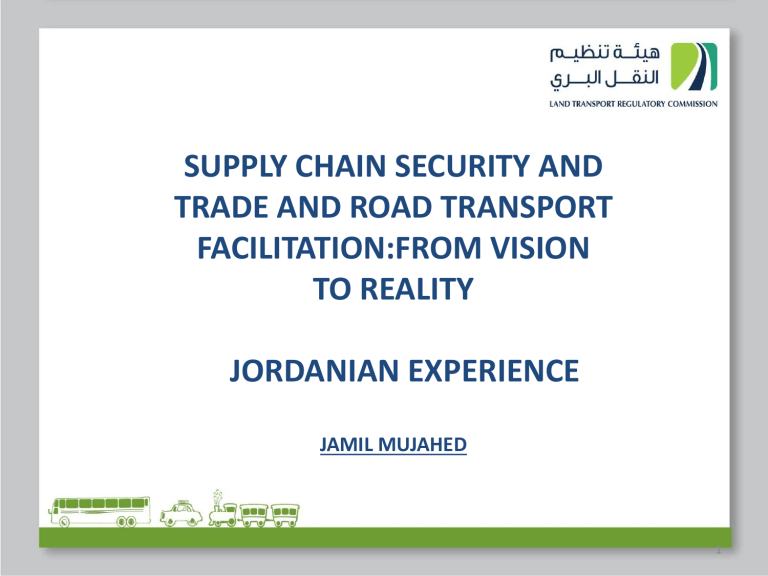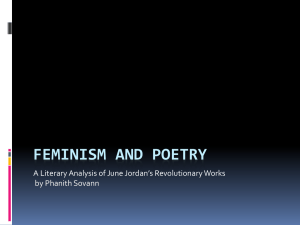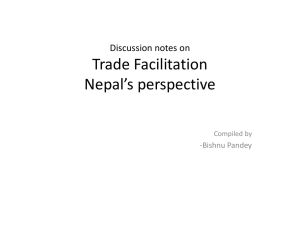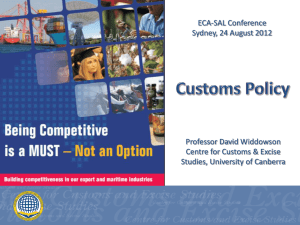Electronic transit monitoring and facilitation system

SUPPLY CHAIN SECURITY AND
TRADE AND ROAD TRANSPORT
FACILITATION:FROM VISION
TO REALITY
JORDANIAN EXPERIENCE
JAMIL MUJAHED
1
• Jordan has played an important role in serving as a transit country within the Middle
East Region. It contributed to enhancing the regional economic development and cooperation through the facilitation of movement of passengers and goods through its borders.
• The numbers of Large Trucks (20 Ton GVW and more) reached approximately 16,000 vehicles.
• Jordan has a well-developed road-network, with over 28781 Km of highways and 4221 Km of secondary roads.
2
Transport Facilitation and
Security
Transport facilitation is a part of trade facilitation and may be defined as the simplification and harmonization of international transport procedures and the information flows associated with them.
Its objective is to increase efficiency by performing complex operations as rationally as possible while keeping a delicate balance between the requirements of the transport industry and the national economy, on the one hand, and the necessity to conform with indispensable governmental regulations relating to national health and security, customs duties and taxes, etc., on the other.
3
Trade and Transport Facilitation
Trade and Transport Facilitation provides important benefits:
Increase trade competitiveness through better logistics, border management, and availability of services for overall improved supply chain performance Result is better cash flow, lower risk, just in time delivery, and more market opportunities (volume and diversification)
4
Supply chain security
Supply chain security refers to efforts to enhance the security of the supply chain It combines traditional practices of supply chain management with the security requirements of the system, which are driven by threats such as terrorism, piracy, and theft. Typical supply chain security activities include:
• Credentialing of participants in the supply chain.
• Screening and validating of the contents of cargo being shipped.
• Advance notification of the contents to the destination country.
• Ensuring the security of cargo while in-transit via the use of locks and tamper-proof seals.
• Inspecting cargo on entry
5
Barriers To Trade
The key barriers to trade include:
• Lack of international electronic trading standards
• Protection of markets
• Bureaucratic border controls
• Poor infrastructure
• Criminal activity
• Lack of training.
6
Jordan Major Activities and Projects in Transport and Trade Facilitation
Like most countries with numerous international borders, Jordan has adopted a number of different approaches to managing domestic and transit traffic and cargo over recent years.
Developing a secure and more facilitative approach to domestic and transit traffic and cargo has been a high priority for Jordan to reduce import and export duration, facilitate trade across borders and improve Jordan ’s global competitiveness ,improved supply chain security ,and full compliance with international obligations .
7
Electronic transit monitoring and facilitation system
The idea of using tracking technology to manage the transit trade in
Jordan was first introduced in 1997 along with a centralized video monitoring system.
The Jordan Customs electronic transit monitoring and facilitation system is a pioneer model and to date, a very successful replacement for the escort system. It has proven it can increase supply chain security, reduce costs and facilitate the movement of goods across borders.
8
Electronic transit monitoring and facilitation system
9
Electronic transit monitoring and facilitation system
The introduction of this system has proven to be very useful:
The need to escort transit trucks has been reduced by more than
90 % •
Transit trade across Jordan has been increased by more than 80 %
Security has been enhanced with more control over the trucks while they are in Jordan.
Reduces the waiting time for the containers at Aqaba port.
Transit journey time has been reduced by more than 60 % .
10
SINGLE WINDOW FOR JORDAN
CUSTOMS
To comply with the requirements of international trade, the import and export companies operating in Jordan have to prepare and submit a large volume of information and documents to the government regulatory agencies. The information and documents are provided, either manually or electronically, to a number of different agencies; incurring additional costs which may constitute a significant burden on both the government and the business community.
One method to address this problem is to utilize single window processing through which information and/or documents related to imports and exports are submitted once, and disseminated to all concerned parties.
11
SINGLE WINDOW FOR JORDAN
CUSTOMS
To strengthen the framework of the single window in Jordan, agencies are signing memoranda of understanding (MOUs) with
Jordan Customs.
The intent of the MOUs is to organize the cargo processing within the single window framework, specifically with regard to the management, operational coordination, and information exchange functions, in order to achieve a single window that is consistent with international standards and contributes to reducing the time and cost associated with import and export operations.
12
SINGLE WINDOW FOR JORDAN
CUSTOMS
And the MoUs have addressed key issues, which can be summarized as follows:
• Jordan Customs shall assume the duty of the administrative supervision on the activities of the parties participating in the single window at the border
• Agreement to exchange data and information between the participating agencies and develop a vision for that
• Adoption of the customs clearance system "ASYCUDA" for the purposes of the exchange of risk management data and information for each agency.
13
ASYCUDA SYSTEM
ASYCUDA is a computerised customs management system which covers most foreign trade procedures. The system handles manifests and customs declarations, accounting procedures, transit and suspense procedures.
Since the launch of ASYCUDA system in 1999 in Jordan, use of paper has been dramatically reduced. During the Customs Department ’s endeavor to utilize a computerized customs system, "ASYCUDA" has been taken into account to review and reform of procedures for development. In other words, reengineering of procedures that lead to simplification and facilitation of such measures for importers and stakeholders alike.
14
ASYCUDA SYSTEM
Most important achievements of the ASYCUDA system led to :
• Significant reduction in paper use.
• Simplify and standardize the procedures.
• Building integrated tariff tables.
• Adoption and integration of international codes in the ASYCUDA.
• Utilize the principles of risk management procedures in the system.
• Enacting relevant provisions for the exchange of data .
15
The Golden List Program
The Golden List Program was designed to create an environment that promotes and recognizes self-regulating companies that are low risk for noncompliance with tariffs and nontariff regulations and that can effectively exercise supply-chain security measures.
Overall, it was a fundamental step in achieving self-regulation. To do this, the project had to build private sector capacity to demonstrate documented due diligence, assist the JC in recognizing low-risk and compliant companies, and develop the auditing capacity and staff within the JC.
From 2006 to 2008,the number of days it takes to export out of
Jordan dropped from 28 days to 19 days, while import time dropped from 28 days to 22 days on average.
16
The Golden List Program
Targeted sectors are Supply chain companies that resist in
Jordan, working in international trade that reveals the standards and conditions of the program and working in the following sectors :
• Import
• Export
• Transport
• Brokers
• QIZ
• Warehouses
17
Golden List Program Benefits
• Expanding green-lane routed cargo.
• Benefiting from pre-clearance service for all materials.
• Immediate release of financially guaranteed cargo prior to declaration filing or processing.
• Direct clearance of truck cargo for import/export companies and
QIZ
• Assigning priority to process declarations pertinent to import/export companies and QIZ.
18
Thank YOU
19








